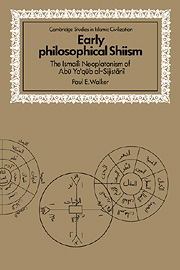Book contents
- Frontmatter
- Contents
- Preface
- Acknowledgments
- Note on transliteration
- List of abbreviations
- PART I AL-SIJISTĀNĪ'S HERITAGE
- PART II AL-SIJISTĀNĪ'S UNIVERSE
- 4 Introduction: categories of thought and terms of analysis
- 5 A theology of unqualified transcendence
- 6 Creation as command
- 7 Intellect, the sum of existent being
- 8 Descending and ascending soul
- 9 Nature and the physical realm
- 10 A cosmic anthropology
- 11 Prophecy, the deputy of intellect
- 12 Interpretation and its institution
- 13 Salvation and the womb of history
- EPILOGUE: THE USE AND CONTROL OF REASON
- Notes
- Select bibliography
- Index
9 - Nature and the physical realm
Published online by Cambridge University Press: 02 November 2009
- Frontmatter
- Contents
- Preface
- Acknowledgments
- Note on transliteration
- List of abbreviations
- PART I AL-SIJISTĀNĪ'S HERITAGE
- PART II AL-SIJISTĀNĪ'S UNIVERSE
- 4 Introduction: categories of thought and terms of analysis
- 5 A theology of unqualified transcendence
- 6 Creation as command
- 7 Intellect, the sum of existent being
- 8 Descending and ascending soul
- 9 Nature and the physical realm
- 10 A cosmic anthropology
- 11 Prophecy, the deputy of intellect
- 12 Interpretation and its institution
- 13 Salvation and the womb of history
- EPILOGUE: THE USE AND CONTROL OF REASON
- Notes
- Select bibliography
- Index
Summary
The next step in the downward direction is the realm of nature and with it the beginning of physical reality. In moving from soul to this product of soul, al-Sijistānī leaves the areas of the greatest tensions between his philosophical understanding of the divine world and a theology required by tradition and scripture. He appears to believe that nature, in so far as it is not a part of the divine world, is, for the most part, a subject best investigated by the scientists. The Qur'n and other sources of Islamic religious dogmas do not contain a concept of nature which, for the most part, either support or deny the material about it in Greek thought. Where problems persist in al-Sijistānī's discussions of nature and the corporeal or terrestrial realm, they are often technical, although a number of points of potential conflict do arise out of the implications implicit in his theories as a whole.
Prominent among the troublesome aspects of al-Sijistānī's concept of nature is that, for him, it is only within the natural world that temporal creation actually takes place. One of the technical difficulties is the status of nature: whether it is as an active and productive force or simply an inherent principle of motion. In general Islamic thinkers voiced considerable uncertainty about what nature is and the term itself was commonly taken to be highly ambiguous.
- Type
- Chapter
- Information
- Early Philosophical ShiismThe Isma'ili Neoplatonism of Abu Ya'qub al-Sijistani, pp. 102 - 106Publisher: Cambridge University PressPrint publication year: 1993



